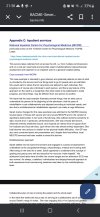Given the having no expertise in severe this lot all bring and the power hierarchy unblinded for editing and who gets final say I assume it’s about making sure the politics of everyone of those listers professional/indidual needs being covered and then bartered out.Do we have a copy of the pre 2023 revisions and post revisions to see how much really it was just those 3 /1 in charge of bacme letting everyone else ‘contribute’ but then change it to what they intended it would be anyway
I thought it was weird gregorowski wasn’t listed on the lists. And that no one on the whole of those lists came from a service where they treated or maybe even had met someone with severe or very severe me.
But I see she had a special slot at the end after it all.
Rather than a doc searching to work out what would be patients needs - so the title turns my stomach in its delusion and lie it’s mis-selling, that is gobsmacking to sell weaponising this document to remove agency from this entire group ‘in the name of’ their needs, and yo have the gall to call it ‘for the needs of the severe’ whilst doing that.
Look at the list of kingdoms /businesses dividing the spoils by making sure it fits those missions and business models and their needs on this list.
There is something so disturbingly sinister they went so far to make it that title claiming it was ‘driven by the needs of the severe and very severe’. I find it stomach churning someone believed they had the right to name it that whilst excluding all people in that group from having a voice and of course they would know a single person in that group of their needs because even if they met them they silence them by telling them they aren’t allowed to have free speech or critique even when it’s entirely about the topic of their own body and agency and who they are and their human rights and freedom not to have personality labels impacting them on top of illness.
I find this so abusive that someone wouldn’t spot this and bystanders aren’t stepping in either. To think there are people in this world that even after they’ve been debunked and called out for the harm done to this sane group and that they were wrong. To then have them react in such a way to target them , the most vulnerable due to that harm they caused and not apologise but look to steal their access to a voice again - and for them not to have shame for themselves but entitlement so strong they think they are doing nothing wrong
Well it’s utterly shocking people like this aren’t curbed and patients protected in the first place . But to realise they are allowed to collect up to plot in a group about how they will join together and agree something that will target this vulnerable group , with them not even expecting they would need at least a group of 20 severe and very severe people they give proper time and adjustments to make sure their thoughts and experiences are the starting point for knowledge (instead of the tropes and assumptions these staff have used as starting points without even realising it’s bigotry if it’s come from a stereotype and you never met or listened to an actual person from that group before believing them) in order to make these claims/documents but to just gloss over such issues. How out of date is this world? It just feels legislation and governance hasn’t caught up in this area and it’s getting played.
Last edited:






